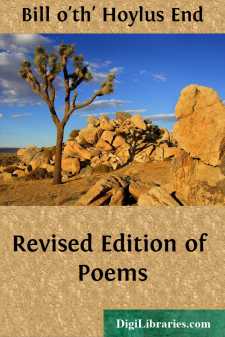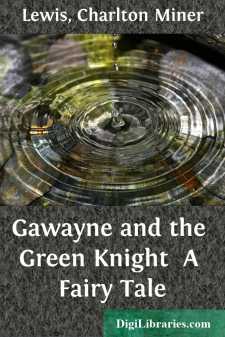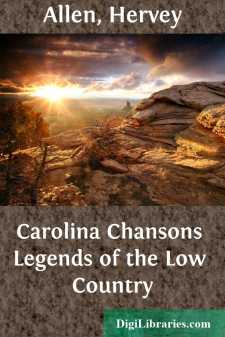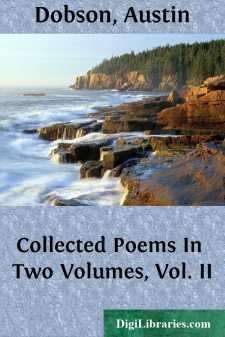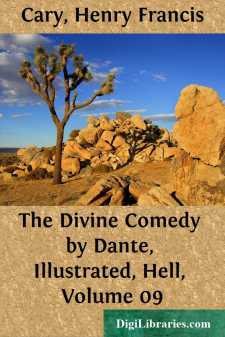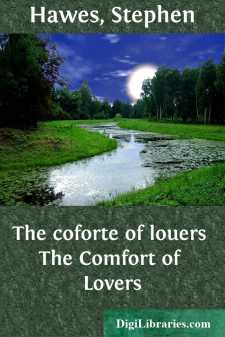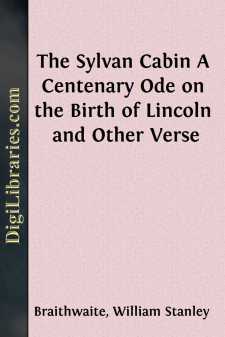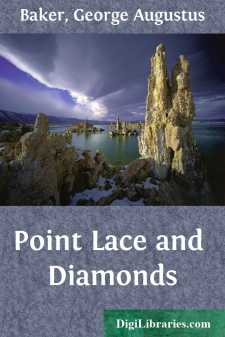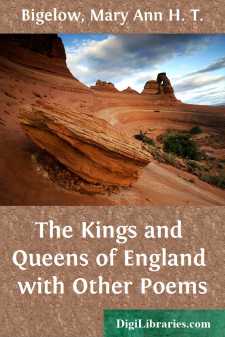Poetry Books
Sort by:
The Grand Old Man of Oakworth. Come, hand me down that rustic harp, From off that rugged wall,For I must sing another song To suit the Muse’s call,For she is bent to sing a pœan, On this eventful year,In praise of the philanthropist Whom all his friends hold dear— The Grand Old Man of Oakworth, Beyond his eightieth year! No flattery! My honest Muse, Nor...
more...
THE GREEN KNIGHTKing Arthur and his court were blithe and gayIn high-towered Camelot, on Christmas day,For all the Table Round were back again,At peace with God and with their fellow-men.Their shields hung idly on the pictured wall;Their blood-stained banners decked the festal hallLight footsteps, rustling on the rush-strewn floors,And laughter, rippling down long corridors,Attested minds at ease and...
more...
by:
Hervey Allen
SÉANCE AT SUNRISEPlace the new handsIn the old handsOf the old generation,And let us tilt tablesIn the high roomOf our imagination.Let the thick veil glow thin,At sunrise—at sunrise—Let the strange eyes peer in,The red, the black, and the white facesOf the still living deadOf the three races.Let a quaint voice begin: Voice of an Indian "Gone from the land,We leave the music of our names,As...
more...
by:
Austin Dobson
AT THE SIGN OF THE LYRE. "At the Sign of the Lyre," Good Folk, we present you With the pick of our quire, And we hope to content you! Here be Ballad and Song, The fruits of our leisure, Some short and some long— May they all give you pleasure! But if, when you read, They should fail to restore you, Farewell, and God-speed— The world is before you! THE LADIES OF ST. JAMES'S. A PROPER...
more...
CANTO XXIX SO were mine eyes inebriate with viewOf the vast multitude, whom various woundsDisfigur'd, that they long'd to stay and weep. But Virgil rous'd me: "What yet gazest on?Wherefore doth fasten yet thy sight belowAmong the maim'd and miserable shades?Thou hast not shewn in any chasm besideThis weakness. Know, if thou wouldst number themThat two and twenty miles the...
more...
by:
Stephen Hawes
Some do endyte / vpon good moralyte Of chyualrous actes / done in antyquyte Whose fables and storyes ben pastymes pleasaunt To lordes and ladyes / as is theyr lykynge Dyuers to moralyte / ben oft attendaunt And many delyte to rede of louynge Youth loueth aduenture / pleasure and lykynge Aege foloweth polycy / sadnesse and prudence Thus they do dyffre / eche in experyence I lytell or nought / experte in...
more...
THE SYLVAN CABIN A CENTENARY ODE ON THE BIRTH OF LINCOLNIO, fairest Dame of sylvan glades,We come to pay thee homage due,Embrace thee softly and to kissThy lovely, long-forsaken cheeks;To smooth thy flowing silver locksAnd bind about thy snowy neckA necklace golden studded fullWith rarest gems and shining pearls.Our eyes, though sometimes dimmed with tears,In purer lustre sparkle forthWhene'er...
more...
INTRODUCTION. o have attempted in former times a work of this description, would have seemed, we cannot deny, to savour either of presumption or of idiotcy, or more probably of both. And rightly. But we live in times of progress. The mystery of yesterday is the common-place of to-day; the Bible, which was Newton's oracle, is Professor Huxley's jest-book; and students at the University now...
more...
RETROSPECTION.I'd wandered, for a week or more,Through hills, and dells, and doleful green'ry,Lodging at any carnal door,Sustaining life on pork, and scenery.A weary scribe, I'd just let slipMy collar, for a short vacation,And started on a walking trip,That cheapest form of dissipation—And vilest, Oh! confess my pen,That I, prosaic, rather hate your"Ode to a Sky-lark" sort of...
more...
The Kings and Queens of England, From the Battle of Hastings or the Norman Conquest, to the Present Reign, Inclusive. First, William the Norman lays claim to the crown And retains it till death; then follows his son The red headed William, whose life is cut short By a shot from his friend, when hunting for sport. Then Henry his brother takes quiet possession, As Henry the first, of the great English...
more...


